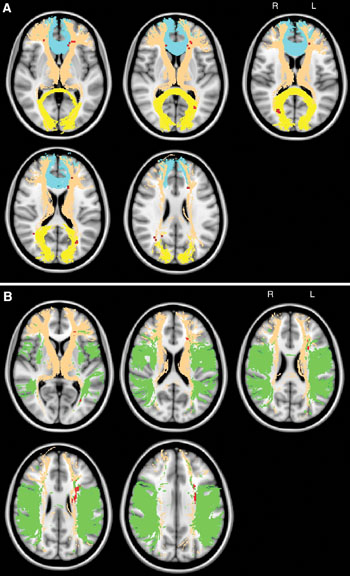Brain MRI Reveals Key Mechanism of Common Cognitive Disorder
By MedImaging International staff writers
Posted on 07 Sep 2016
An assessment of brain MRI scans and cognitive examination results, in patients suffering from symptomatic carotid artery disease, indicates that disruption in the communication networks of the brain is a key mechanism of vascular cognitive disorder.Posted on 07 Sep 2016
The results also indicate that brain MRI scans could be used to help improve the diagnosis of patients with the common cognitive disorder. The study was published online, in the September 2016 issue of the journal Radiology.

Image: The topography of chronic ischemic lesions related to global cognitive impairment (A), and the topography of chronic ischemic lesions related to impaired fluency (B) (Photo courtesy of RSNA).
The researchers from the University of Nottingham (Nottingham, UK) assessed Magnetic Resonance Imaging (MRI) brain scans, and the cognitive exam results of 108 patients suffering from symptomatic carotid artery disease. Fifty-three of the patients suffered from cognitive impairment.
The researchers found a clear correlation between cognitive performance of the patients, and chronic vascular disease-related lesions in white matter tracts of the brain. The researchers concluded that white matter tract skeleton mean diffusivity was a useful tool to improve the diagnostic accuracy of vascular cognitive disorder, because it offered a close correlation with impaired cognitive performance.
Vascular cognitive disorder is becoming more common in the elderly, and is difficult to diagnose, and distinguish from Alzheimer's disease, and other forms of dementia. The researchers plan to continue to track the progression of sub-cortical disconnection, and look for changes in the patients over time.
The researchers concluded that sub-cortical disconnection is a key mechanism of vascular cognitive disorder. The result is a breakdown of communication in the large-scale cognitive neural networks of the brain.
Senior author of the study, Dorothee P. Auer, PhD, University of Nottingham, said, "Using standard clinical brain MRI, we found that microscopic damage of main white matter tracts allowed us to distinguish patients with symptomatic carotid artery disease and cognitive impairment from those who were cognitively intact. Our findings mean that a simple MRI test might improve the diagnostic work-up of people with suspected vascular cognitive disorder, and holds further promise to track progression of the disorder".
Related Links:
University of Nottingham














